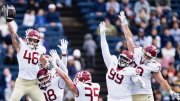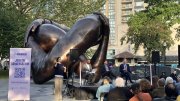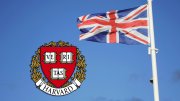The scene is reminiscent of something you might see at a zoo.
Inside the Science Center, passing students are crowding in front of the large glass windows of the Greenhouse Cafe, eager to catch a glimpse of the creatures within. Some observers roll their eyes and some snicker. Others grin knowingly. But very few actually step inside.
What they are watching is in fact extraordinarily commonplace. Seated at tables around the cafe are students just like the ones outside. They are studying and playing board games, often stopping to talk or to have a cup of coffee. There are some whose hair is slightly unkempt or whose outfits don't exactly match—hardly unusual in a college setting. But these students are different. They are nerds. And they are proud.
Such was the setup at Harvard's first "Studyfest," a 24-hour academic marathon sponsored by the newly formed Society of Nerds and Geeks (SONG).
The group's founders say that by tackling stereotypes about intellectualism, they will help promote social acceptance of those who simply love to learn. They maintain that even at an academic institution like Harvard, society ostracizes those who choose study-oriented intellectual pursuits over social and athletic activities.
In recent years popular images of nerds have bombarded the big screen, from the socially inept techie in teen movies to large-eared, bow-tied cult figure, Pee-Wee Herman. But SONG members like president Jeremy Kahn '90 say those images are not only negative but also completely inaccurate.
"As long as people come and talk to us, they get a real-life view of things, instead of stereotypes," said Kahn at the Studyfest while working on a complex equation with a fellow nerd. "The problem is that people think they know what a nerd is. Nobody wears pocket protectors anymore."
SONG also aims to be specific about what a nerd is. Their manifesto states, "We are a group of women and men genuinely interested in the pursuit of knowledge, unabashedly intense about our academics, and non-conformist in our ways of thinking." Kahn admits that the group's name may turn some people off but says that their intention is to make people realize the absurdity of the label. "No one would call themselves a nerd if not for the irony," says Hillary Anger '93, the group's vice president.
Kahn agrees that those studying math and science are more likely to be classified as nerds, but he claims that anyone can be a nerd or a geek. "I believe very strongly in all shapes and sizes and styles of intelligence," says Kahn. "Someone who's strong in math is going to have math intelligence. Someone who's strong in writing is going to have writing intelligence." He adds that SONG's growing membership represents all intellectual types, and SONG members are quick to mention that their adviser, Paul Widerman '83, is also an assistant wrestling coach.
But if the nerd population is so diverse, couldn't there be a little nerd in every Harvard student? Although SONG members maintain that every
student has nerd potential, they also assert that anti-intellectualism is alive and well at Harvard. Furthermore, they say that while nearly all students at the College take their studies seriously, only some feel they have a "moral duty to pursue knowledge," as Kahn likes to put it.
"There's a difference between taking studies seriously and fostering intellectualism," says Anger. And in an essay in the New York limes, Harvard doctoral candidate and SONG founding member Leonid Fridman writes, "Many students are ashamed to admit, even to their friends, how much they study. Although most students try to keep up their grades, there is but a minority of undergraduates for whom pursuing knowledge is the top priority during their years at Harvard." To that Kahn adds, "It's the difference between having a moral duty to study or just doing it to get ahead."
SONG boasts ambitious goals and strives to move beyond the status of a social club for intellectual outcasts. Some of its demands are aimed at institutional changes; it bemoans Harvard's lack of a round-the-clock reading room and plans to build a shantytown, calling it "Harvard's only 24-hour library."
But even more ambitious are its efforts to change students' perceptions. Kahn and Fridman both point to athletic teams as one source of anti-intellectualism on campus. Athletics can be an intellectual experience if the athlete makes it so, says Kahn. "The question is not, Are you playing ball or reading books? but, Are you using sports to help you see the world?" Adds Fridman, "We're not saying, 'Jocks bad, nerds good.'"
In fact, SONG finds some of its more ardent fans among "jocks." Greg Gicewicz '90, captain of this year's Harvard football team and a chemistry and physics concentrator, says he is considering joining the nerds and geeks. "Heck, I've been called a nerd and a geek," he says.
Gicewicz contends that although football may not be the most intellectual activity, it has its own rewards. "You can't compare going out on the football field to doing a problem set for physics," he says. "But I've found that being involved in sports as an extracurricular activity, the physical aspect of it, being able to hit something, provides a nice balance to the intellectual or the academic." And Gicewicz even agrees with Fridman that peers are often responsible for creating anti-academic pressure. "It's sad when someone is not popular because he or she is smart," he says. "Instead of our role models being athletes, maybe they should be straight-A students."
While Kahn also targets Harvard's nine all-male final clubs as sources of anti-intellectualism, Samuel Archer '90, president of the Phoenix Club, denies any prejudice on the part of his own club, although he does admit that some clubs "could have an anti-intellectual atmosphere." Archer takes issue not with SONG itself but with its choice of a name. He says that someone Kahn might call a nerd or a geek would be welcome in the Phoenix Club but would not be labeled as such. "Any person who's very into studying would be considered an intellectual, not a nerd or a geek," says Archer. "That's degrading."
So where is the source of the nerd-bashing that SONG is claiming to fight? Are average Harvard students anti-intellectual, and if not, are they necessarily geeks? Talking to random students on a late-night stroll through Lamont Library during exam time suggests that Harvard students consider themselves neither. "I like learning in general, but I don't feel I owe it to society to learn anything. It's not a moral obligation," says Glenn Slater '90. Others agree that they enjoy learning but complain that the pressured atmosphere does not allow them to enjoy studying. "I like studying, but right now I'd rather be asleep," says freshman Aiko Yoshikawa as she prepares for a religion test. At times like these, the enlightened pursuit of knowledge is secondary to the all-night cram session.
Most students, even those who say they enjoy studying, vehemently deny they are nerds. Others believe that all nerdiness is relative. "Am I a nerd?" one studying freshman asks herself. "In terms of the real world, yes," she answers. "But at Harvard? No."
# # # A three-year debate over the best way to ensure diversity within the College's twelve residential Houses ended in January when Dean L. Fred Jewett announced that the Class of '93 will select their upperclass housing through a system of non-ordered choice. Under the new plan, which will be reviewed after three years, rooming groups no longer will rank their three top House choices but instead will list four unranked choices and be assigned randomly to one of them. The plan represents a compromise between the dean and those House masters who favored some form of random assignments, and other House masters and many students— freshmen in particular—who preferred the status quo ("The Undergraduate," January-February, page 68).
# # # At least eleven Harvard seniors already know what they're doing next fall: going abroad.
Three are headed to Oxford as Harvard's newest Rhodes Scholars. Classicist Joel Shin is from Adams House and Birmingham, Alabama. Basilios Tsingos, from Winthrop House and Manchester, New Hampshire, is a social studies concentrator, as is Mary Hall-ward, from Dunster House and Montreal, who won one of the eleven Canadian scholarships.
Harvard's fourth Rhodes winner is third-year Medical School student Reza Gandjei, of Palo Alto, California, who also won a Marshall Scholarship. Gandjei declined his Marshall, but four seniors happily accepted theirs. Jonathan Kolodny, a computer science concentrator from Lowell House and West Newton, Massachusetts, will study at the Medical Research Council in Cambridge, England. Physics concentrator Kevin Benson, of Cabot House and La Jolla, California, is Oxford-bound, along with mathematician Tad Wieczorek, of Mather House and Orlando, Florida, and economics concentrator Jennifer Wu, of North House and Bethesda, Maryland.
This year's Rockefeller Scholars will go farther afield. Government concentrator Curtis Chang, of Cabot House and Goldens Ridge, New York, plans to work with church groups, Asian community groups, and anti-apartheid activists in South Africa. Thomas Chavez, a computer science and philosophy concentrator from Currier House and Albuquerque, will study musical styles in South America. Fellow Currier resident John Drew Colfax of Boonville, California, whose concentration is biological anthropology, hopes to introduce the Tuareg of northern Mali to the benefits of goat-herding. Meanwhile, psychology concentrator Julie Reardon, of Winthrop House and Bristol, Connecticut, hopes to be immersing herself in Asian society, with a special focus on family life and the elderly.








